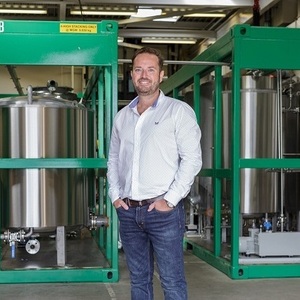Biodiesel project developer signs site lease for plant in Oman

Photo: Green Fuels
July 14, 2020
BY Ron Kotrba
A new, small-scale biodiesel project is being developed in Oman on the Arabian Peninsula, in the Khazaen Economic City. Wakud International LLC, a joint venture involving U.K.-based biodiesel technology and equipment provider Green Fuels, recently signed a lease on its new facilities.
“The site lease has been signed at the new Khazaen Economic City, so we can start site works in Oman,” James Hygate, founder and CEO of Green Fuels, told Biodiesel Magazine. “We are also now starting the construction of the equipment in the U.K.”
The facility, scaled at approximately 2.1 MMgy, will process locally collected used cooking oil into biodiesel and other biofuels.
Advertisement
Advertisement
“This is a first step towards a larger [sustainable aviation fuel] facility using Green Fuels’ [Sustainable Aviation Through Biofuel Refining (SABR)] process in the region,” said Hygate, also a founding director of Wakud International.
Construction on the biodiesel production facility will begin in the third quarter of this year and will be completed by mid-2021.
Advertisement
Advertisement
“The aim behind the establishment of this plant is to optimize the utilization of untapped potential resources and contribute towards Oman’s economic diversification,” said Khalid Al Balushi, CEO of Khazaen Economic City.
Maher Al Habsi, CEO of Wakud International, said, “We intend to collaborate with all interested parties and stakeholders to create a biofuel hub in Oman centered around our biodiesel project with Green Fuels in Khazaen.”
Wakud International is a joint venture between U.K.-based biodiesel technology and equipment provider Green Fuels; San Diego-based ProtoStar Group, self-described as a hybrid between a philanthropic foundation, venture capital firm and incubator; and Khazaen Economic City CEO Al Habsi; with special support from Oman’s Implementation Support & Follow Up (ISFU) unit and Oman-based Ejaad, a membership-based virtual collaborative platform where industry, academia and government can interact and engage in energy-related research and innovation activities.
Related Stories
The USDA significantly increased its estimate for 2025-’26 soybean oil use in biofuel production in its latest World Agricultural Supply and Demand Estimates report, released July 11. The outlook for soybean production was revised down.
The U.S. Energy Information Administration maintained its forecast for 2025 and 2026 biodiesel, renewable diesel and sustainable aviation fuel (SAF) production in its latest Short-Term Energy Outlook, released July 8.
XCF Global Inc. on July 10 shared its strategic plan to invest close to $1 billion in developing a network of SAF production facilities, expanding its U.S. footprint, and advancing its international growth strategy.
U.S. fuel ethanol capacity fell slightly in April, while biodiesel and renewable diesel capacity held steady, according to data released by the U.S. EIA on June 30. Feedstock consumption was down when compared to the previous month.
XCF Global Inc. on July 8 provided a production update on its flagship New Rise Reno facility, underscoring that the plant has successfully produced SAF, renewable diesel, and renewable naphtha during its initial ramp-up.
Upcoming Events










